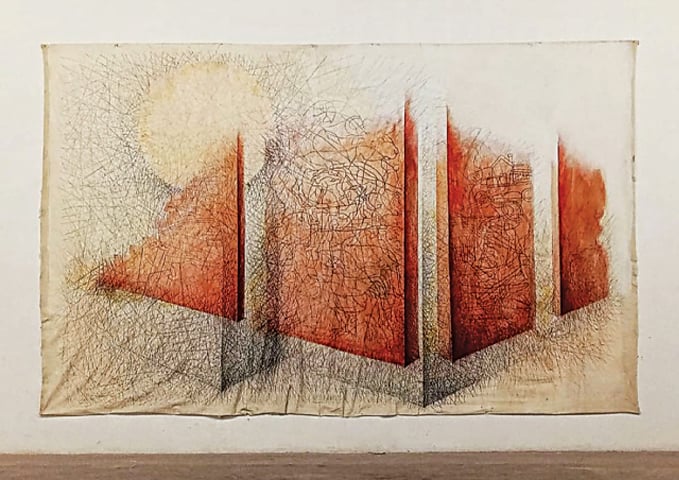
For some years now, artist Munawar Ali Syed has been raising his voice about ecological issues through his art. His recent solo show, ‘Talash-i-Gumshuda’ [Search For That Which Is Lost] that recently opened at the Sanat Initiative in Karachi, not only reflects his concerns, but is also one of his finest works.
Although urbanisation has brought several benefits to people, it increasingly repudiates opportunities for the physical, emotional, psychological and spiritual health that nature can bestow on them. The growth of cities, deforestation, consumerism and the use of plastics, with land and water bodies filling with toxic chemicals and other non-biodegradable waste, continues in the face of ghastly climatic changes that spell destruction and disaster, robbing every living being of a healthy life.
Syed is a multidisciplinary artist who holds an MA in Art Education from Beaconhouse National University. He has a BFA in Sculpture from the National College of Arts, Lahore.
‘Talash-i-Gumshuda’ is an apt title for the show, which can be divided into three parts: three-dimensional animal sculptures, ‘Diary Series’ drawings, and ‘Between the Lines’ metal sculptures.
Munawar Ali Syed’s recent solo show reinforces his concerns about rapid urbanisation and its attendant environmental catastrophes
The life-sized animal sculptures, such as the buffalo, have become a hallmark of Syed’s practice, who grew up in Hyderabad, Sindh. The sight of the water buffaloes wallowing in muddy ponds and lakes is quite familiar for him. One almost expected to walk into the large warehouse space of the gallery to find such life-sized sculptures but, instead, found ‘Kaaf Se Kutta’ [D For Dog] — the only life-sized one.
There were smaller versions of ‘Hay Se Hathi’ [E For Elephant], ‘Gaaf Se Gainda’ [R For Rhino], and ‘Chay Se Cheetah’ [C For Cheetah] created in clear resin, plastic and paint, and embedded with discarded plastic and metal knick knacks. It is an obvious reference to animals ingesting plastic and metal waste that can block their digestive tracts. As a result of which they starve.
In 2020, Syed and his artist wife Shahana held an exhibition at Sanat titled, ‘This Is Our Quarantine Diary’. In it, the couple, in their own individual idioms, shared their anxieties and fears, but also their hopes and resolutions. Syed’s ‘Diary Series’ for ‘Talash-i-Gumshuda’ is a continuation of sorts, not of living in isolation, but of the much grimmer struggle for survival.
His 12 abstract, masterful and meditative drawings in pen-and-ink on archival paper have a lot packed into them. These compositions dotted the walls of the cavernous gallery space. In some drawings, there is a cube that could be representing the Kaaba. There is a large spherical mass in others, that could be interpreted as the sun, or the Earth, but could also be the now familiar spiky and menacing image of the Covid-19 virus.

This ‘Diary Series’ with its geometrical and organic forms of animals, the ubiquitous crow, floating clouds, the ominous atomic bomb mushroom cloud, as well as human figures, are in yellow, orange and black parallel line hatchings. It is quite intense and solemn.
His ‘Work in Progress’ is the most conspicuous canvas, installed at the far end of the gallery. It is eye-catching due to its large size and, as the artist himself suggests through its title, it still needs some work.
The seven metal drawings called ‘Between the Lines’ require a careful survey. It seems that, in a measured attempt, Syed turned the ‘Diary Series’ into linear sculptures. The juxtaposition of animals and birds, everyday objects, toys and furniture, chopped tree branches, together with a young toddler who can be seen in at least five of these linear sculptures, convey an urgent realisation of the jumble of life we are in.
All living things are in a constant battle for survival while animals and trees are left to the mercy of humans, but the latter’s lust is insatiable. The continuous spread of soulless concrete structures and insensate cutting of trees across the country, to make way for lucrative businesses to take over those spaces, is not something that we are unaware of.
As if this isn’t enough to destroy the urban environment, there’s also the swelling garbage heaps engulfing all humanity. Consumerism, as explained by American sociologist Emily Stewart, is the perfected tactics of marketers and advertisers who, “convince us to purchase things, some we need, some we don’t… the more people spend, the logic goes, it is better for everybody — never mind that they’re sometimes spending money they don’t have, or the implications of all this production and trash for the planet. People, naturally, want things.”
To “keep up with the Joneses” is another persuasive factor. Hence, we in Pakistan also see a large number of airconditioned shopping malls mushrooming. One is bewildered and hapless but not helpless, if the realisation sets in each of us. Conscientious artists like Syed must continue to remind us of the looming catastrophe we are moving towards.
‘Talash-i-Gumshuda’ was exhibited at the Sanat Initiative, Karachi, from May 10-19, 2022
Published in Dawn, EOS, May 29th, 2022















































Dear visitor, the comments section is undergoing an overhaul and will return soon.